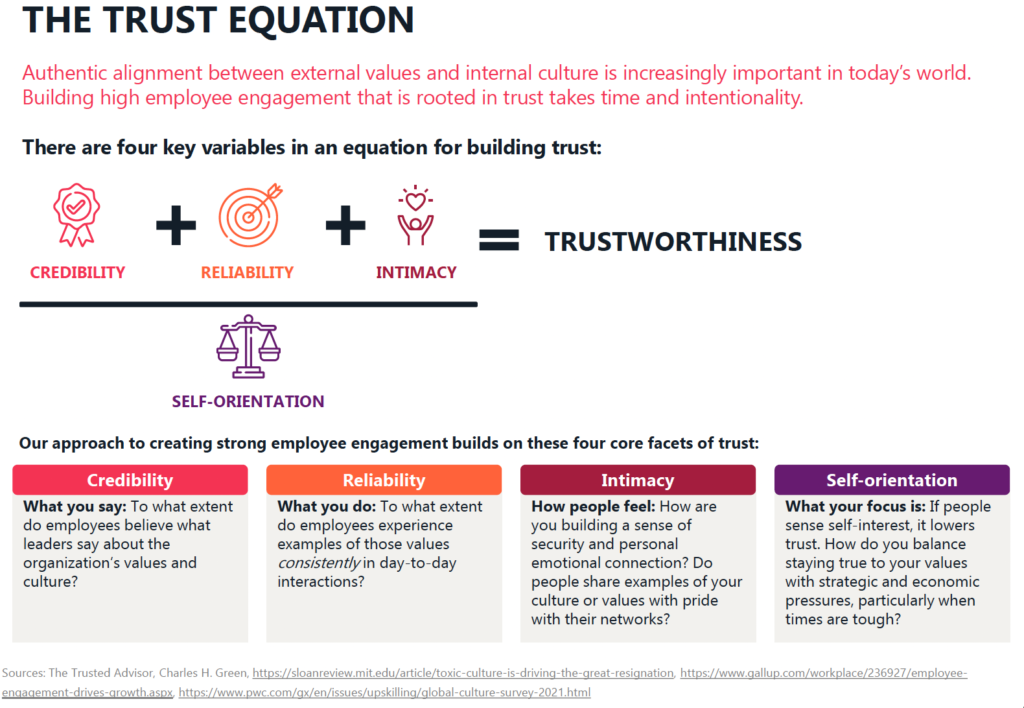August’s episode digs into the subject of meaningful transformation and why it’s increasingly important for organizations today to think about how to connect the values they espouse with what their employees experience day to day.
After a quick intro by VP of Content Ellen Mallernee, host Linda Descano, CFA®, EVP, starts by asking Hannah Caldwell, principal of Gate One, a London-based business and digital transformation consultancy within the Havas network, to define what “meaningful transformation” means.
What You’ll Learn in This Episode:
- Trends that have influenced the need for increased focus on the employee experience and meaningful work
- What steps an organization can take to maintain the alignment between what they say and what they do
- A framework for building trust with employees
What does meaningful transformation mean?
A “meaningful transformation” is a business transformation that delivers a step change in the impact and results delivered for the business but that’s also meaningful for the individuals involved in that change — it’s about making it really matter to employees to ensure that it lasts, says Hannah.
Hannah cites the statistic that 70% of large transformation projects fail; she then explains why that’s the case: “One of the key reasons why those big transformation projects fail is the human element. Fundamentally, it’s not organizations that change; it’s people that change — or in some cases, they don’t. If people don’t believe in the vision that leadership is sharing, if they don’t trust leadership, they’re not going to adjust to new ways of doing things or make the effort required to create a step change in the way you operate, regardless of how brilliant the strategy and rationale is.”
Linda and Hanna’s exploration of meaningful transformations dovetails with Havas’ new 2023 Global Meaningful Brands™ report, “Welcome to the Me-conomy.” The report, which serves as a playbook for how brands can be meaningful in people’s lives, was the subject of our May podcast episode.
Says Hannah, “A lot of companies are increasingly aware of the need to connect meaningfully with their customers on issues they care about, such as sustainability and supporting Pride, but this has focused more on attracting customers. We’re now also seeing a complementary desire to focus on the internal side: what employees experience and the internal culture as a measure of whether organizations are authentically living the values they say they stand for.”
Why the employee experience matters more than it once did
So what trends are influencing the increased focus on the employee experience and meaningful work?
Three things stand out, says Hannah. First, post-pandemic employees are rethinking the meaning of work and priorities and seeking purpose from work (contributing to the great resignation). And generationally speaking, Gen Z is a purpose-driven generation. Their desire to know how their individual contributions help support the organization’s mission differentiates them. Finally, information travels so quickly in the digital age, and social media means many more voices are heard.
Linda then asks what steps organizations can take to maintain the alignment between what they say and what they do. What’s most critical, says Hannah, is for organizations to listen and understand — without an ego — what people are experiencing within your organization. She also advises bringing together those teams that traditionally only managed elements of external or internal communications so that both have a full view. And if you’re building an external campaign on a topical issue such as ESG or DE&I, Hannah says there are a lot of ways to involve employees in those campaigns.
When organizations neglect their corporate culture, the repercussions can be enormous. Hannah cites research from MIT that found that toxic corporate culture is 10 times as likely to lead to attrition as poor compensation, whereas positive company cultures are more likely to attract top talent and see 33% higher revenues.
How to build trust with employees
The conversation closes with a discussion of practical steps that marketers and communicators can take to drive a positive culture within their teams and the businesses they support.
Look and listen for tangible examples of how employees describe your culture and values, says Hannah. “Believe it or not, there’s a mathematical equation for building trust!”
She tells us of Charles H. Green’s Trust Equation, which details four components that affect trust. Three of them increase a person’s trustworthiness: credibility, reliability and intimacy. The fourth one, self-interest, reduces a person’s trustworthiness.

“If people believe that you’re doing these things because you have an ulterior motive, or it’s part of a corporate initiative and you’re just trying to tick a box, they’re all undermined by that,” says Hannah. “So it’s really important that you balance that carefully. In an organizational context, there will always be some elements of self-interest because of strategic decisions that need to be made, or economic imperatives, but it’s very important that people see that you’re very thoughtfully balancing your values with those challenges, and they don’t just get pushed to one side when times are tough.”
Give “Red Sky Fuel for Thought” a listen, and subscribe to the show on iTunes, Spotify or your favorite podcasting app. Don’t forget to rate and review to help more people find us!